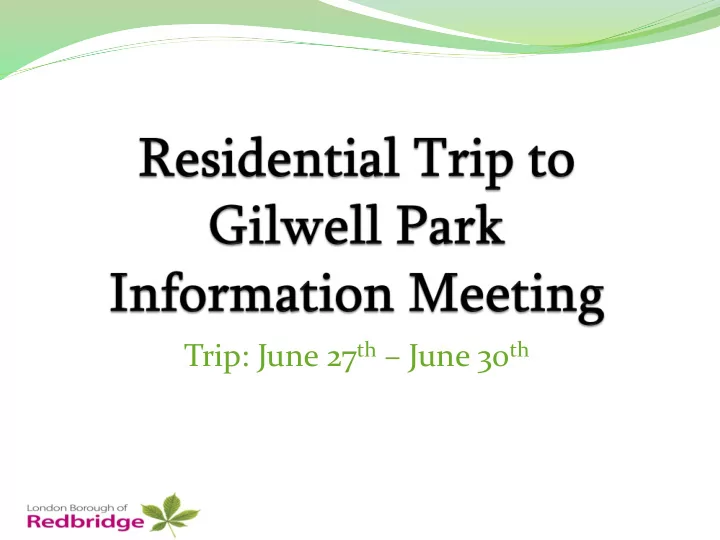

Trip: June 27 th – June 30 th
Gilwell Park residential? It is a 4 day (3 night) stay at one of England’s largest Scout camps in Chingford. A 22 min drive away.
Gilwell Park The children will stay in bunkbeds in dormitories and will spend their days enjoying a range of adventurous activities such as canoeing, climbing, high ropes, archery, raft building, night hikes etc. It is a once in a lifetime opportunity to learn independence, courage, responsibility and have a great time with their friends before they head off to secondary school.
Tuesday the 27th Arrive at school at normal time (8:50am). Drop luggage off in the Olympic hall. Children should come to school in outdoor clothes ready for their first activity. Registration and last minute checks then onto the coach by (9:30 approx.) We plan to leave school and head to Gilwell Park at 9:45. Please feel free to wave the children off if you are able to attend. Bring a packed lunch for that first day – all other meals are provided.
Friday 30 th The children will return to school around 2:30pm – but pick up is at normal end of school time – 3:30pm
Catering The 4 days will be fully catered. Breakfast, lunch and dinner (apart from lunch on the Tuesday when we arrive! They will need a packed lunch Tuesday.) There will always be a vegetarian, halal, kosher, vegan option, as well as catering for children with allergies - Just let us know!
Site Info Staff are all fully trained and qualified. Secure site and with staff available 24/7. Staff members (from both school and from Gilwell Park) will accompany children around all activities. Mrs O’Connor, Miss Shepherd and Mr Fryd will accompany the children. Gilwell Park is a 23 minute drive, so other staff can attend the site and bring a child back within an hour.
Safety precautions All staff have up-to-date DBS The site is not accessible to the public No mobile phones are allowed – because we don’t know who children might be calling, who’s calling them, what they are looking at online, what they are taking videos and photos of, what they are sharing online etc.
Accommodation The Dorothy Hughes Centre This centrally-heated 'log- cabin' style building sleeps 40 and has a large well- equipped kitchen complete with caterer sized equipment and facilities. Leaders' rooms, toilets, hot showers and a large hall are amongst its many other attractive features. You need to provide all of your own bedding.
What they will need Bedding Sleeping bag or duvet, Pillow and flat sheet (they will only provide a mattress!) Clothes Pyjamas or bedclothes and dressing gown T-shirts or polo-shirts (2 per day) Trousers (2 per day – joggers or tracksuit bottoms NO jeans!) Shorts are optional Underwear and extra socks Trainers (preferably 2 old pairs. NO CROCs or sandals etc.) Water proof jacket (thin please, not a winter coat!) Fleece or warm jumper for cold days or cooler afternoons/evenings (to go over other clothing) Extra jumpers for activities Practical sunhat/cap Toiletries Shampoo Shower gel Toothbrush and toothpaste Flannel/sponge Deodorant (roll-on only) Towels (1 small and one large is useful) Plenty of hair bands Sun cream (children will be expected to apply their own!) Miscellaneous/Medical Plastic bags (put dirty trainers/underwear/clothes etc.) Staff will keep hold of any medication/asthma pumps – but they must be clearly labelled with instructions. Drinks bottle Strap or tie for glasses Cheap or disposable camera. Medication in a clearly named bag with a medication form completed (this form is attached to this letter) Cuddly toy (optional)
What not to bring Expensive or designer clothes Anything of any sentimental value Anything of value (no expensive cameras, 3DS, PSP, iPad, iPod etc) – there won’t be time to use them! A cheap torch or cheap camera is fine though! No Mobile phones – We can not risk children; accessing the internet unsupervised, posting photos to social media, making or receiving calls etc. Basically, try not to send them with anything that you will be upset about if it got: lost, broken, covered in mud, dropped in water etc.
Getting in contact One of the main aims of the residential stay is to develop independence, confidence and leadership. For this reason, we do not allow direct contact. There is also very little time to talk. Children get more upset when calling home than if they just carry on. If there is a family emergency and you have to make contact, then call the school and then they can contact Mrs Shepherd, Mrs O’Connor or myself on our mobiles. If we’re on the middle of a lake or halfway up a climbing wall and can’t be contacted they can contact the centre directly.
Any Questions?
Recommend
More recommend